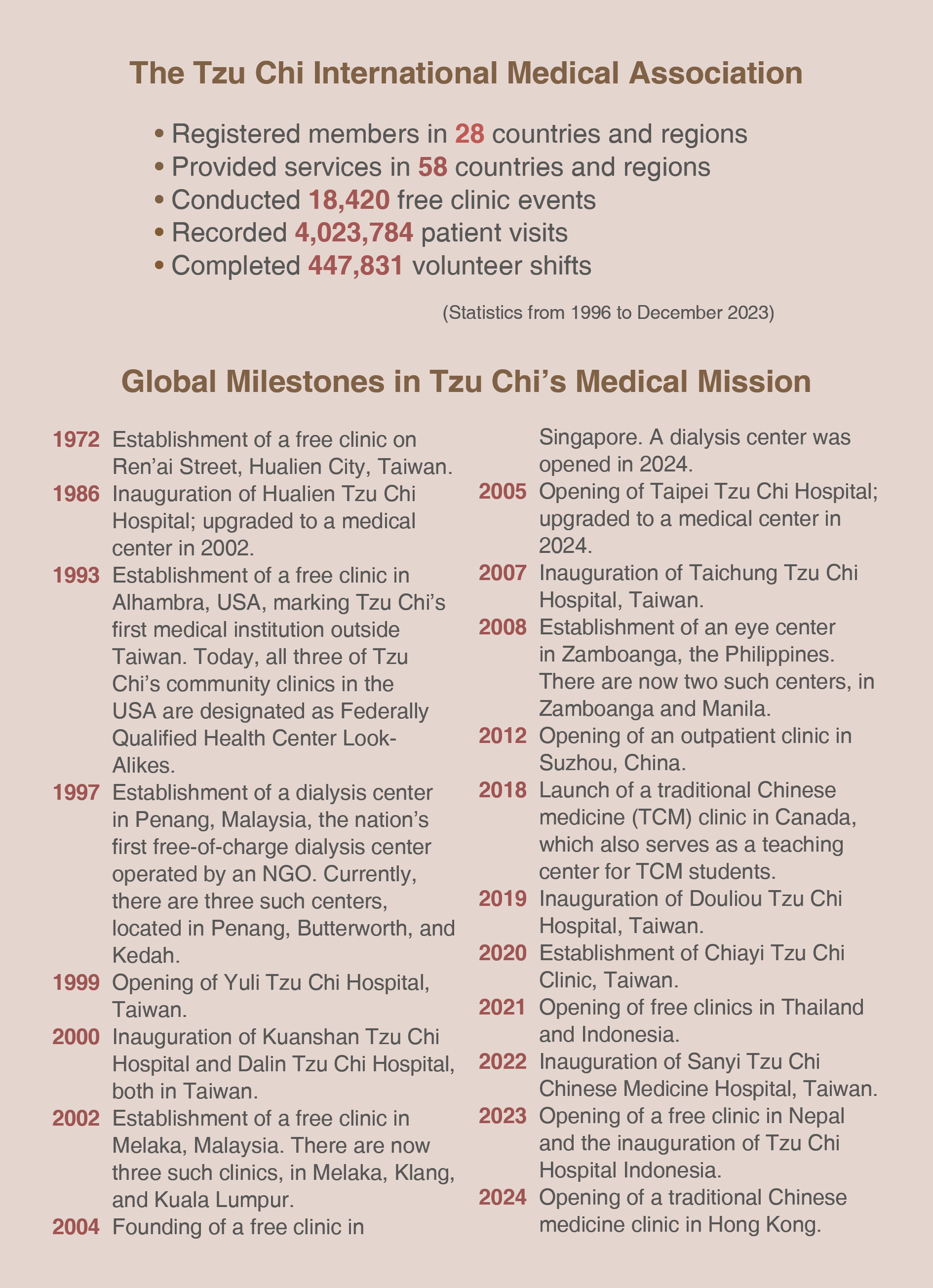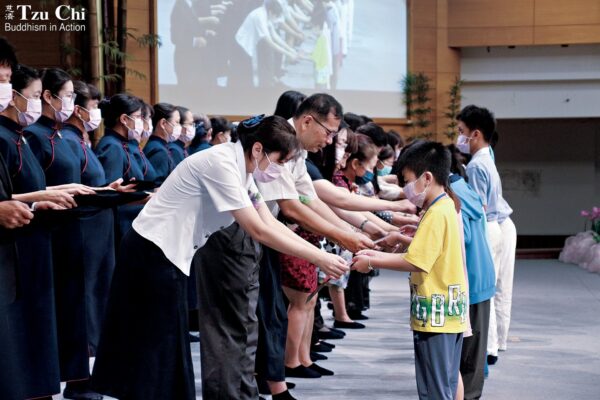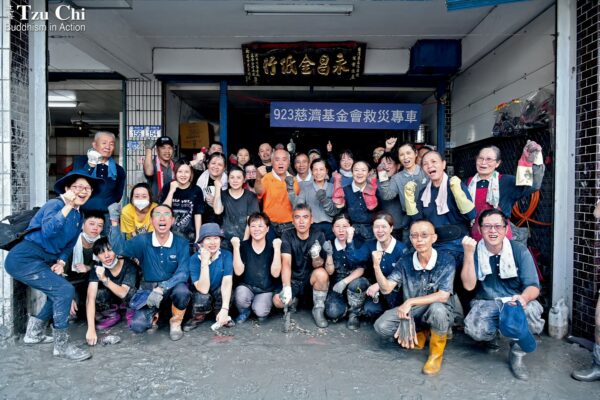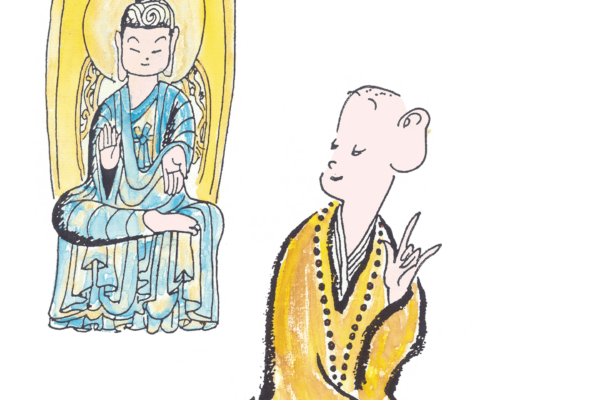By Yeh Tzu-hao
Translated by Wu Hsiao-ting
“Ensuring healthy lives and promoting well-being for all at all ages” is the focus of the United Nations’ Sustainable Development Goal 3. This vision has also guided Tzu Chi’s medical efforts over the past five decades, benefiting communities worldwide.
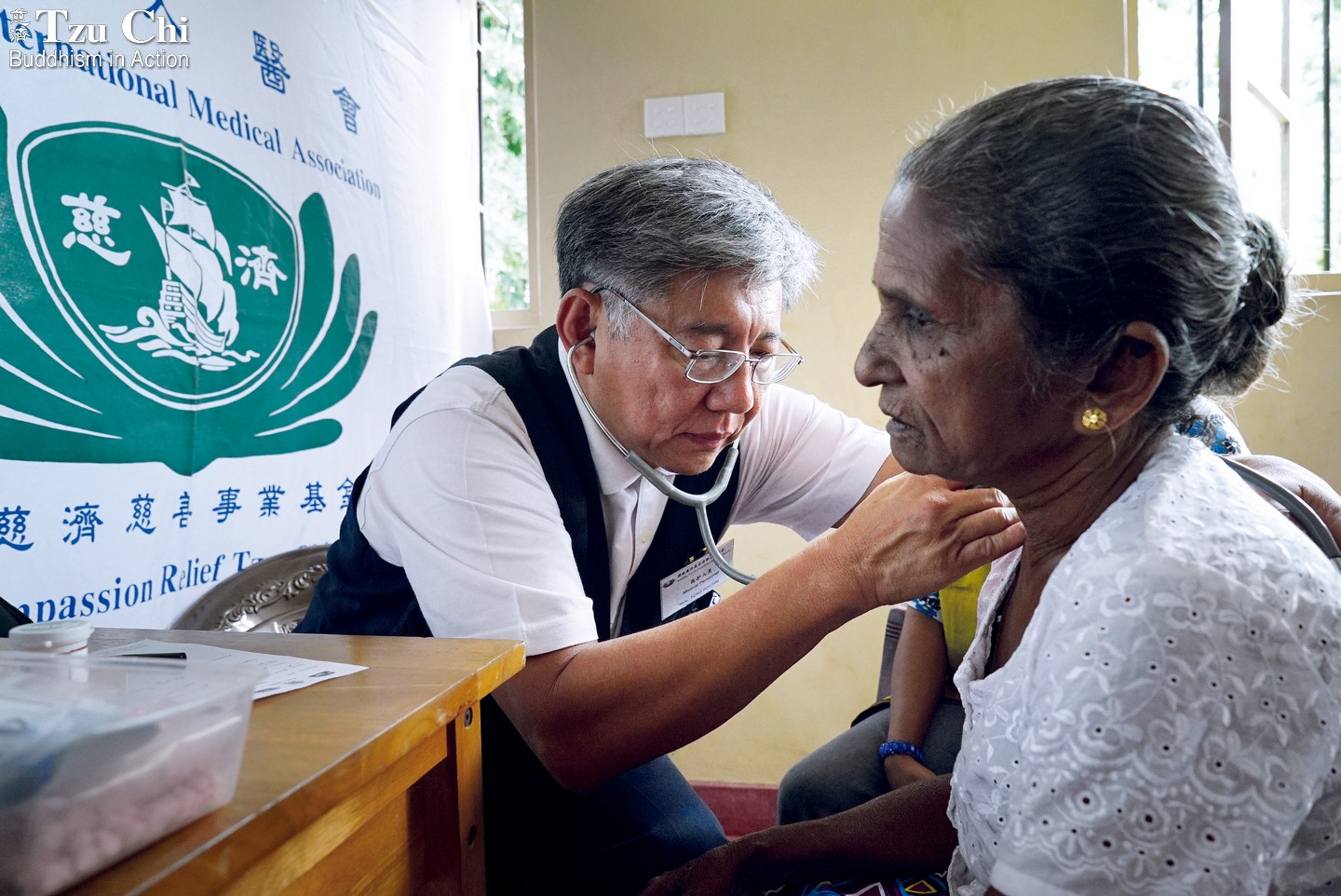
A doctor from the Singapore chapter of TIMA sees a patient during a free clinic event in Colombo, Sri Lanka. Hsiao Yiu-hwa
Dapu Township, located in the mountainous region of Chiayi County in southern Taiwan, lies within the catchment area of the Zengwen Reservoir. The reservoir’s construction significantly affected local agriculture, prompting many young residents to leave in search of better opportunities. As a result, the township was for many years unable to support a medical institution.
To help meet the needs of this underserved community, the Tzu Chi International Medical Association (TIMA) provided free clinics in the area for a decade. Healthcare professionals and support volunteers visited each month to offer care but could not stay long-term. That changed in 2002, when Dalin Tzu Chi Hospital, which opened in 2000, began participating in two government healthcare programs and stationing doctors in the area. Finally, this enabled local residents to gain easier access to essential medical care.
Dr. Lin Ying-lung (林英龍), a specialist in family medicine, is the current resident physician and head of the emergency room at the medical station in Dapu. Over the past eight years, he has averaged only two days off per month. He’s treated everything from bee stings and snakebites to traffic accidents, work-related injuries, and heart attacks. In addition to Dr. Lin’s work, specialists from Dalin Tzu Chi Hospital visit on a rotating basis to offer additional support in fields including rheumatology, cardiology, dermatology, and dentistry.
The healthcare team also makes home visits. “We’ve established a strong network with home care workers to identify patients who can’t come to us. For these, we go to them to provide care for them in their homes,” said Dr. Yeh Ming-hsien (葉明憲), a traditional Chinese medicine practitioner from Dalin Tzu Chi Hospital. He serves at the station every Wednesday, and for the past 22 years, has personally visited bedridden or housebound patients after completing his duties at the station.
Thanks to the team’s efforts, many elderly residents have shown significant health improvements. Stroke patients who were once bedridden can now stand, and individuals with dementia have regained speech and mobility, some even able to tell stories. In addition to providing 24-hour medical coverage for Dapu residents, Dalin Tzu Chi Hospital also offers mobile medical services in Meishan Township and Zhuqi Township in Chiayi County, as well as Gukeng Township in Yunlin County.
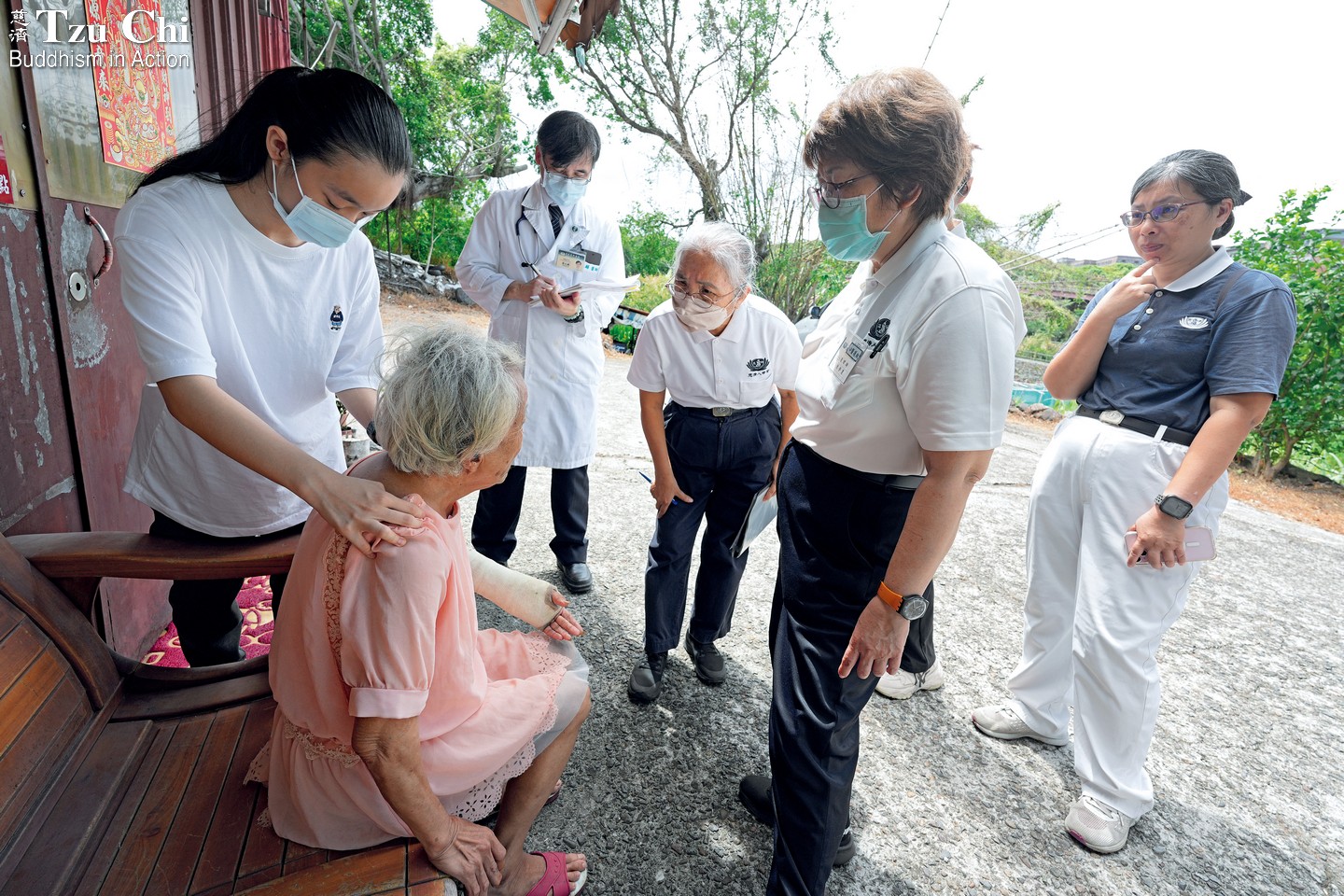
TIMA members in northern Taiwan regularly visit rural areas such as Sanzhi, Shuangxi, Ruifang, and Pingxi in New Taipei City to care for the health of elderly residents, forming bonds like those of old friends. Li Zheng-ming
Serving underserved migrant workers
Dharma Master Cheng Yen recognized a link between poverty and illness as early as 1966, the year Tzu Chi was founded in Hualien, eastern Taiwan. Illness often drives families into poverty, while the impoverished are more likely to develop serious health conditions due to their inability to afford treatment for common ailments. In response, the Master established a free clinic on Ren’ai Street in Hualien City in 1972. In addition to on-site services, medical professionals conducted home visits in rural areas in Hualien and neighboring Taitung. Recognizing the need for a modern, well-equipped hospital in remote eastern Taiwan, Master Cheng Yen established Hualien Tzu Chi Hospital in 1986.
Currently in Taiwan, Tzu Chi operates two medical centers, two regional hospitals, four medium-sized or small hospitals, and a clinic. Furthermore, more than 2,700 TIMA doctors, nurses, pharmacists, and support volunteers provide free services to those in need. In rural areas where elderly residents have difficulties accessing healthcare, TIMA volunteers make home visits to deliver care. These mobile services reach not only remote villages and mountainous regions but also underserved groups in urban areas.
TIMA members in northern Taiwan have partnered with the Taipei City Government for 20 years to provide medical services to foreign migrant workers. Held at Taipei Main Station—a popular gathering spot for migrant workers—these free clinic events offer consultations in specialties such as mental health, internal medicine, dentistry, ophthalmology, orthopedics, gynecology, and traditional Chinese medicine. Medications are dispensed through partner clinics using National Health Insurance cards. Although procedures like blood draws and injections are not performed on-site, the services that are offered provide vital support to migrant workers.
“How old is the grandpa you care for?” asked a clinical psychologist at one such free clinic. “Eighty years old,” replied a migrant worker. “You mentioned having trouble sleeping. Do you feel dizzy? How many hours do you sleep at night?” the psychologist continued. “Four hours,” the worker answered. Despite the bustling atmosphere at Taipei Main Station on Sundays, these exchanges carried on undisturbed.
Tzu Chi volunteer Yan Mei-ling (顏渼姈) is the contact person for the free clinic, currently held about three times a year. She explained that most migrant workers they serve come from Indonesia and work as home caregivers for elderly individuals needing substantial assistance. Such demanding work often leads to physical strain and disrupted sleep patterns. Since many hospitals and clinics are closed on Sundays, the usual day off for most migrant workers, it can be hard for them to get the medical care they need. To meet their needs, TIMA specifically chose Sundays to offer services.
Other than serving remote areas, islands, and migrant workers and the homeless in urban areas, TIMA volunteers and Tzu Chi medical personnel in Taiwan also visit facilities to provide care for other vulnerable groups, such as patients in a vegetative state or those with paralysis, alleviating their suffering and easing the minds of their families.
Gaps in SDG 3
“Ensuring healthy lives and promoting well-being for all at all ages” is the third Sustainable Development Goal of the United Nations. The aim of the goal is to significantly reduce maternal, infant, and under-five child mortality rates by 2030. It also seeks to achieve universal health coverage, including financial risk protection; ensuring access to essential healthcare services; and making safe, effective, high-quality, and affordable medicines and vaccines available to all. Although Taiwan has nearly achieved these targets, significant gaps remain in healthcare access in many other parts of the world.
According to the World Health Organization and the World Bank, out-of-pocket medical expenses have pushed hundreds of millions of people worldwide into extreme poverty. Furthermore, fewer than ten percent of the global population has access to medical services on par with those offered by teaching hospitals. In developing countries across Southeast Asia, Africa, and Latin America, many destitute individuals struggle to obtain even basic clinic services, let alone hospitalization for advanced care.
In countries without well-established healthcare systems, Tzu Chi’s medical mission addresses far greater needs. In areas where access to essential medical care is limited, even a simple surgical procedure can profoundly impact the fate of an entire family.
At the Tzu Chi Eye Center in Manila, the Philippines, patients with eye diseases begin arriving early in the morning from various regions. Often guided by family members due to impaired vision, they come seeking examinations and treatment. One such patient was Kevin Andrade. Blind for over three years due to cataracts, he had been unable to afford treatment. At one point, despair had overwhelmed him to the extent that he attempted to take his own life, but one of his children intervened and saved him just in time. Now he anxiously waited in the recovery area, recovering after cataract surgery at the eye center.
“Do you see this?” Dr. Catherina Coronel-Nasol asked Kevin after his surgery, holding out a finger. Kevin replied dejectedly, “No.” But after resting for three hours, he suddenly stood up and walked to and from the toilet on his own—moving as though his vision were completely normal. Everyone was surprised and overjoyed. Although only the vision in his right eye had been restored, it filled him with hope as he eagerly looked forward to returning to work to support his family.
The Tzu Chi Eye Center, offering free, critical eye care to those in need, recorded 20,000 patient visits in 2023 alone. Similarly, a prosthetics center in Zamboanga City, southern Philippines, provides free, customized prosthetics to people with disabilities, addressing another essential aspect of medical care for underserved populations.
These services are just one facet of Tzu Chi’s nearly three decades of medical work in the Philippines. With over 7,000 islands, the country faces significant wealth inequality and transportation barriers. Many impoverished residents in remote areas live their entire lives without ever visiting a hospital. To bring healthcare to these underserved communities, Tzu Chi volunteers established medical outreach teams in the Philippines in 1995.
Dr. Josefino Qua (柯賢智), a senior member of TIMA Philippines, reflected on those early days: “We started with nothing.” Their first anesthesia machine was a second-hand unit phased out by the U.S. military; lacking specialized surgical lamps, they improvised with regular light bulbs; and surgeries were performed in school libraries or offices, with desks serving as makeshift operating tables. Despite these limitations, the volunteers were driven by a deep passion to help others.
“The number of nurses and other volunteers participating grew with each event,” Dr. Qua said. “Even though there was no financial compensation or recognition, everyone stayed committed. While much has changed over the years, the one constant has been love.”
TIMA Philippines now conducts three to four large-scale free clinics in the country annually. Over nearly 30 years, volunteers have held more than 260 such events, recording over 300,000 patient visits.
In addition to the Philippines, Tzu Chi has been organizing free clinics in Indonesia, Malaysia, and Singapore for many years, with teams often crossing borders to provide assistance. For example, in August 2024, volunteers from Singapore teamed up with medical professionals and support volunteers from Sri Lanka to host a free clinic in Sri Lanka’s Kalutara District. The event brought together 352 healthcare workers and other volunteers. While doctor visits are free in Sri Lanka, patients are required to pay out-of-pocket for medications. In recent years, the cost of medicine has doubled, placing a significant financial burden on low-income residents.
This free clinic, offering services in traditional Chinese medicine, dentistry, ophthalmology, and internal medicine, was held at Katugahahena Divisional Hospital, a public facility staffed by only four doctors and lacking both ophthalmology and dentistry specialties. A root canal procedure at a private hospital costs 40,000 Sri Lankan rupees (US$135), making it unaffordable for many. Consequently, although the free clinic officially began at 8:30 a.m., some local people arrived as early as 3 a.m. to secure their place. Over the course of two and a half days, the clinic provided care for 4,600 patient visits.
Tzu Chi’s medical efforts worldwide have not only brought relief to patients but also sparked a passion for service among healthcare professionals. For instance, Dr. Ruzbih Bahtiar, a TIMA volunteer in Indonesia, found the experience of serving patients in a free clinic profoundly fulfilling. When patients expressed their gratitude, he humbly remarked that he was the one who had benefited more. “Fulfilling others’ needs is an incredibly rewarding experience,” he said.
Tzu Chi has held free clinics for foreign migrant workers at Taipei Main Station for 20 years. Jiang Bao-qing
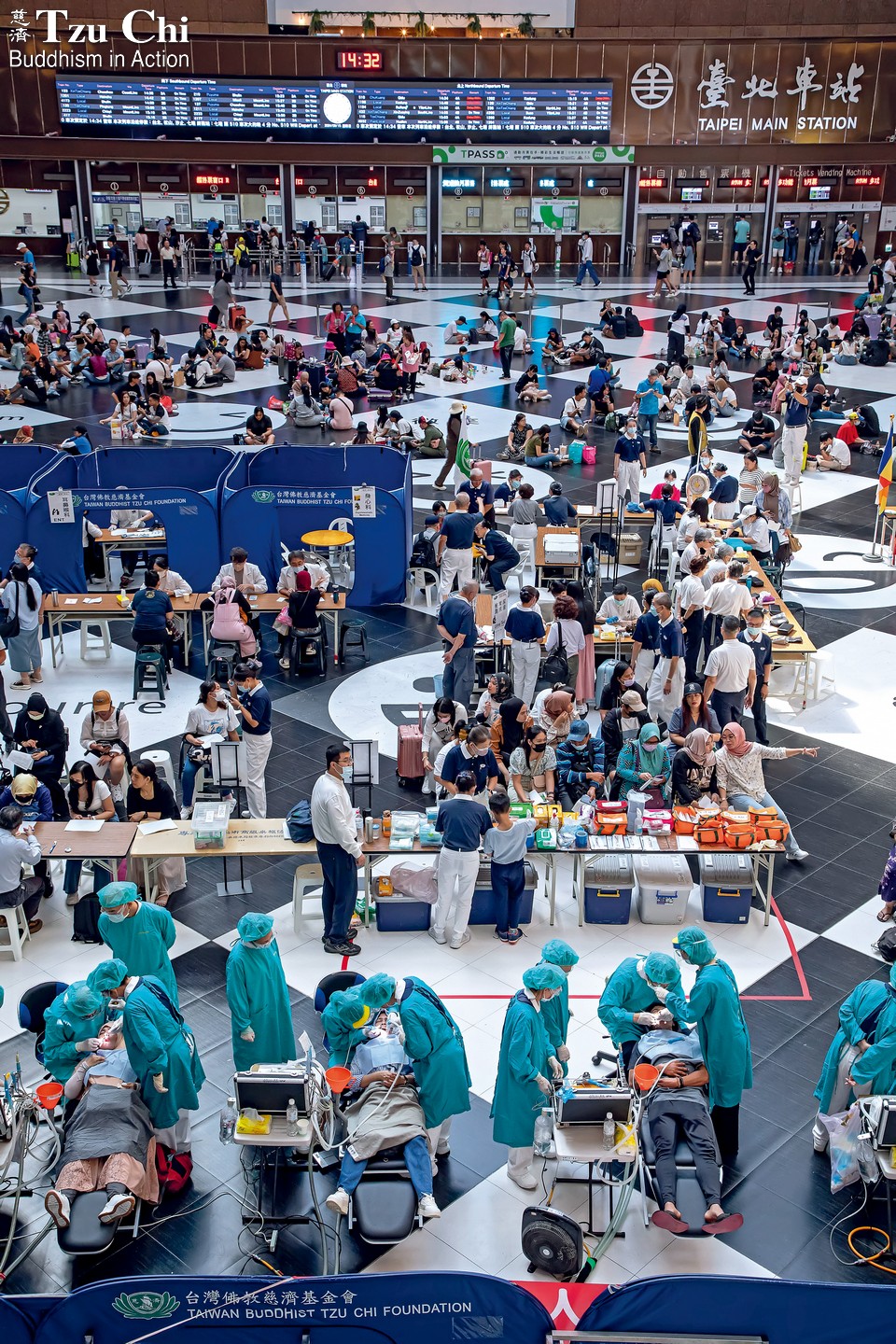
Serving people in affluent countries
It is not surprising that less-developed regions in Southeast Asia, Latin America, and Africa require humanitarian medical aid. But why would a nation like the United States—renowned for its world-class medical standards and high per capita income—still have a substantial need for free clinics?
“The issue lies with insurance and legal status,” explained Dr. Lin Chin-lon (林俊龍), CEO of the Tzu Chi medical mission and convener of TIMA. He is a former superintendent of the Northridge Hospital Medical Center in Los Angeles, and he pointed out that while most U.S. citizens have basic health insurance, undocumented immigrants lack coverage and are often left helpless in the face of medical emergencies. Job loss and subsequent poverty can also render insurance premiums unaffordable, leaving individuals vulnerable. “For people without insurance, even a simple appendectomy can lead to bankruptcy,” he lamented.
To address gaps in healthcare access for underserved communities, Tzu Chi USA opened its first permanent clinic in Alhambra, California, in November 1993, offering free medical services to those in need. Initially providing treatment in internal medicine, dentistry, and traditional Chinese medicine, the clinic gradually expanded its healthcare specialties and even installed showers to serve homeless patients. In 2005, the clinic transitioned into a community health center, offering paid healthcare to the general public while continuing to provide free services to underprivileged populations. Its commitment to supporting the less fortunate remains unchanged.
To tackle the vast geographic challenges of the United States, Tzu Chi USA has also launched 12 mobile medical units. These specially equipped vehicles travel to underserved communities, offering on-site services such as vision exams and dental care.
“We can complete a vision test and fit someone for glasses within an hour,” said Dr. Kenneth Liao (廖敬興), a dentist and senior volunteer with TIMA USA. “This is practically unheard of in New York and has a profound impact on students from low-income families.” He explained that many underprivileged students are unaware they have vision problems. Unable to see the whiteboard clearly, these students may struggle academically. By providing eye exams and glasses, TIMA volunteers help these students see clearly and stay focused during their lessons. “Their grades can improve significantly—from a C to an A,” he said with a smile.
Today, TIMA chapters operate in 24 locations across the United States. Volunteers also serve communities abroad through free clinic events in countries such as Mexico, Haiti, the Dominican Republic, Ecuador, and Bolivia.
Globally, TIMA has members in 28 countries and regions. More than 15,000 doctors, nurses, medical technicians, pharmacists, and administrative volunteers work together to provide free medical services to disadvantaged patients. TIMA volunteers also respond to major international disasters by actively participating in relief efforts. By the end of 2023, TIMA had delivered care in 58 countries and regions, with over four million instances of medical aid provided.
Harnessing technology
As the landscape of global healthcare evolves, Tzu Chi continues to adapt its approach to delivering care. Healthcare professionals in the 21st century are witnessing revolutionary advancements that are transforming the field. Dr. Wang Pen-jung (王本榮), former dean of the College of Medicine at Tzu Chi University and current CEO of Tzu Chi’s educational mission, highlighted the growing role of artificial intelligence (AI) in healthcare. “AI-assisted diagnostic imaging will inevitably surpass human doctors in accuracy,” he stated. “It can help address disparities in healthcare resources and resolve supply-demand imbalances. When integrated into telemedicine, its reach becomes virtually limitless, enabling care for underserved populations in remote areas. Whether it’s precision medicine, personalized healthcare, or digital therapies, AI will be a powerful tool for us.”
That said, while embracing cutting-edge technologies, it is essential to maintain a human-centered approach to care—addressing both the physical and emotional needs of patients. Striking this balance is key to truly advancing health and well-being for all.
Dr. Wang emphasized three guiding principles for healthcare providers: “First, cure—possessing the professional expertise to diagnose illnesses and safeguard life; second, care—attending to the needs of patients; and most importantly, comfort—soothing the suffering of those in pain.” He explained that these “three Cs” capture the essence of healthcare and reflect the core values that Master Cheng Yen has always advocated: healthcare must remain human-centered, dedicated to protecting life, safeguarding health, and nurturing love. These principles continue to guide Tzu Chi’s healthcare workers and volunteers as they strive to provide compassionate, life-changing care.
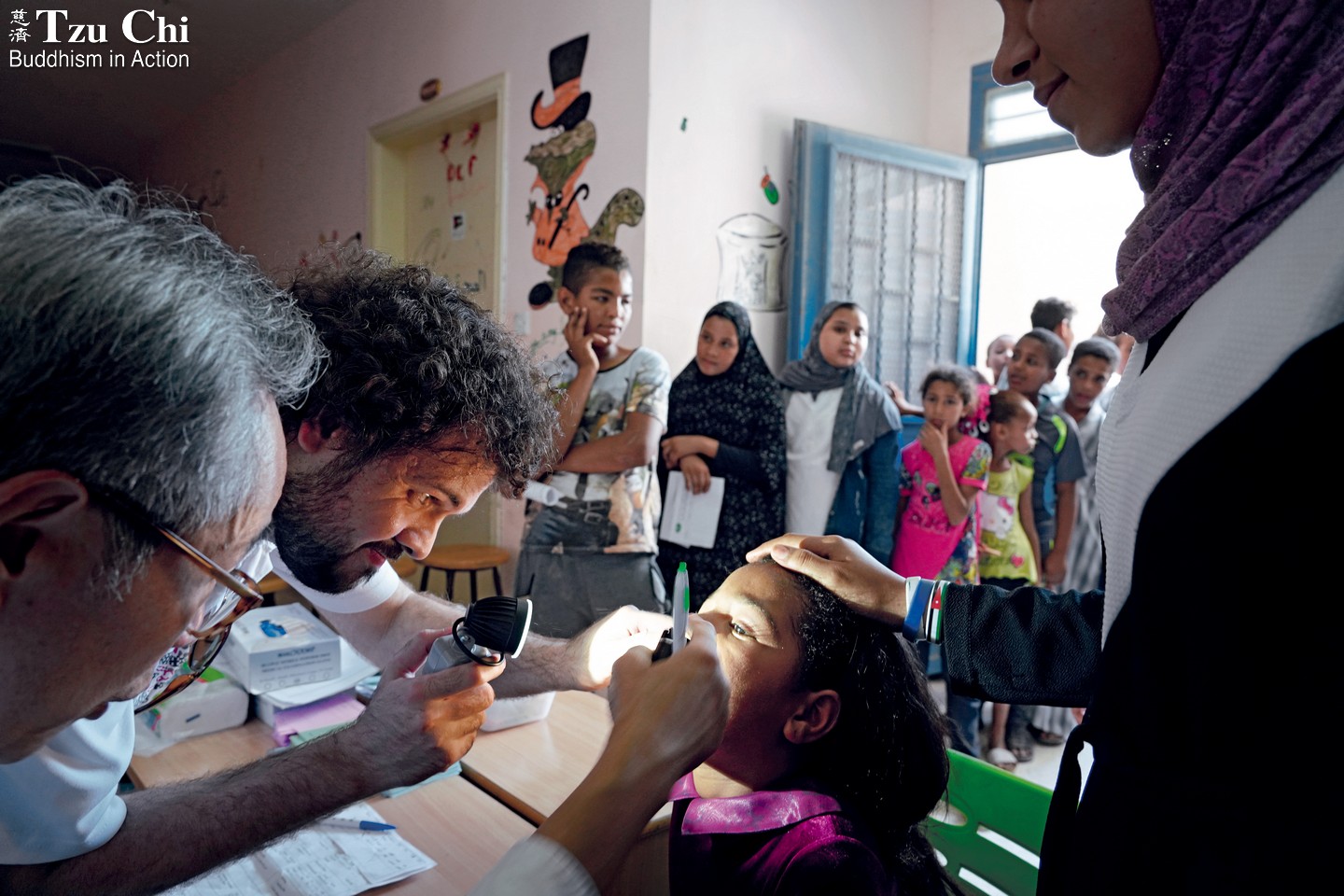
In Jordan, Tzu Chi volunteers have long provided assistance to those in need, including Syrian refugees. Volunteers from Taiwan have made multiple trips to the country to offer support. In 2019, a dental clinic was held in Ghawr as-Safi, where men, women, and children patiently waited for treatment despite the heat. Hsiao Yiu-hwa
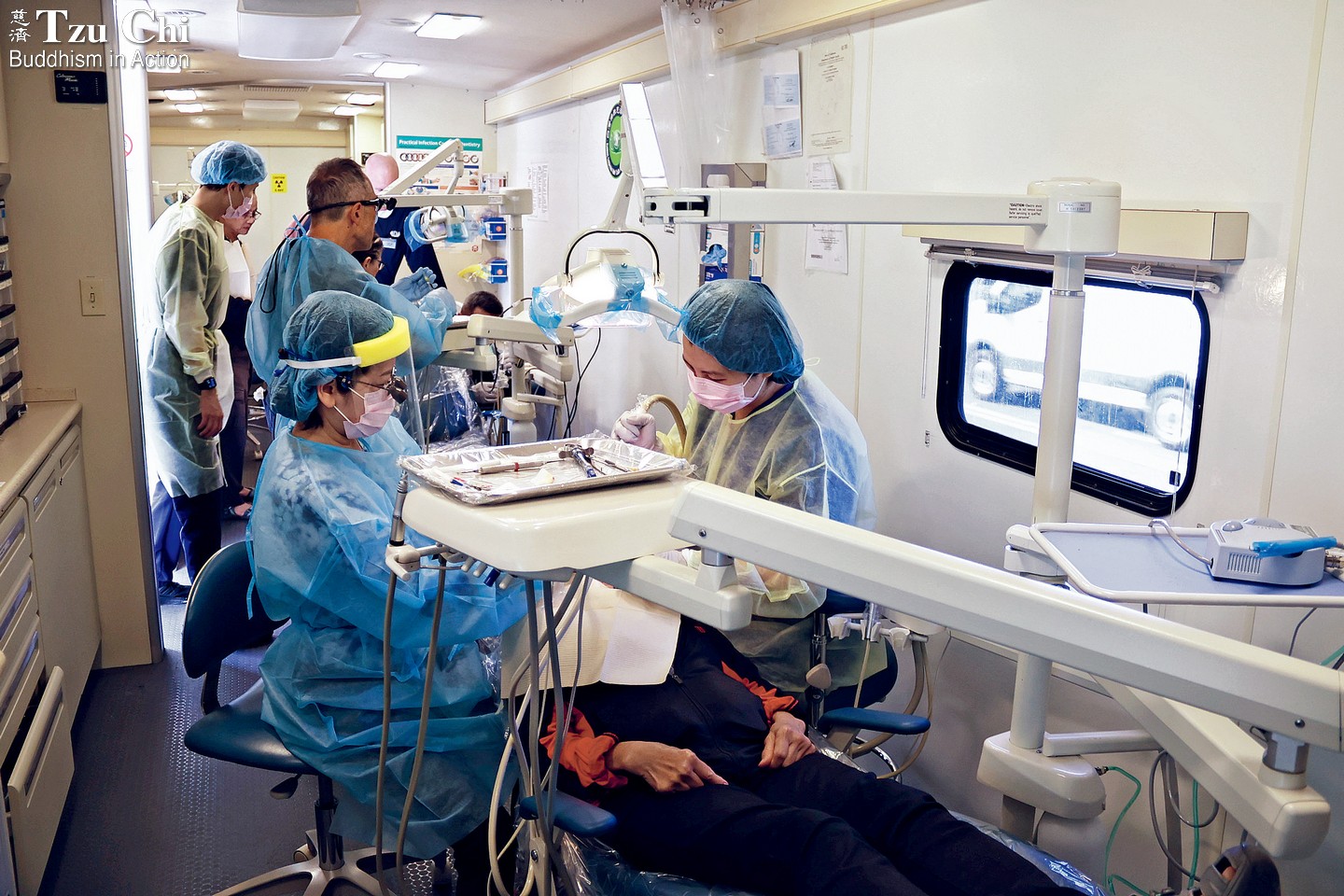
Low-income individuals and those without health insurance receive dental care aboard a mobile dental unit in Oakland, USA. Lu Wan-jie
